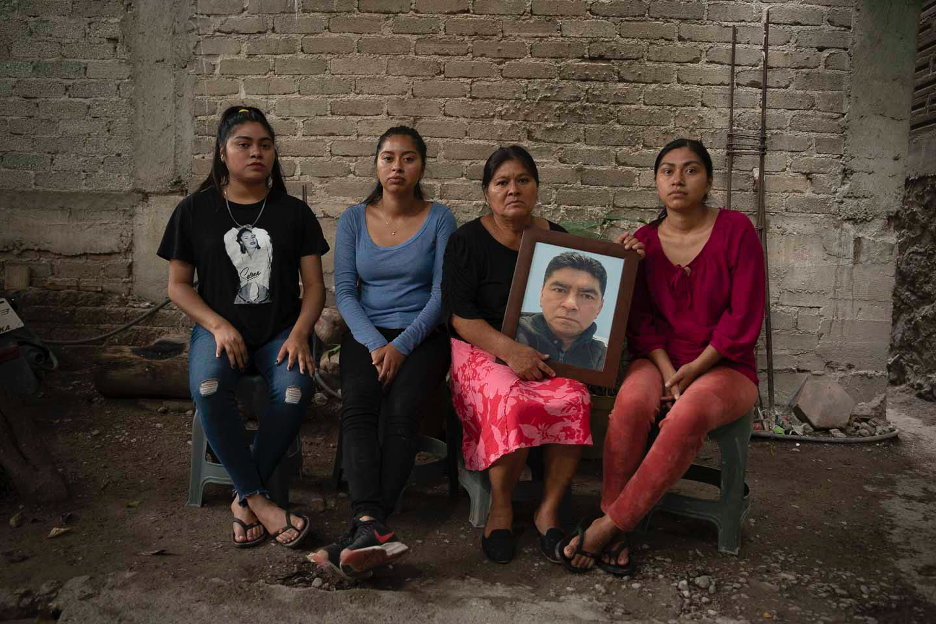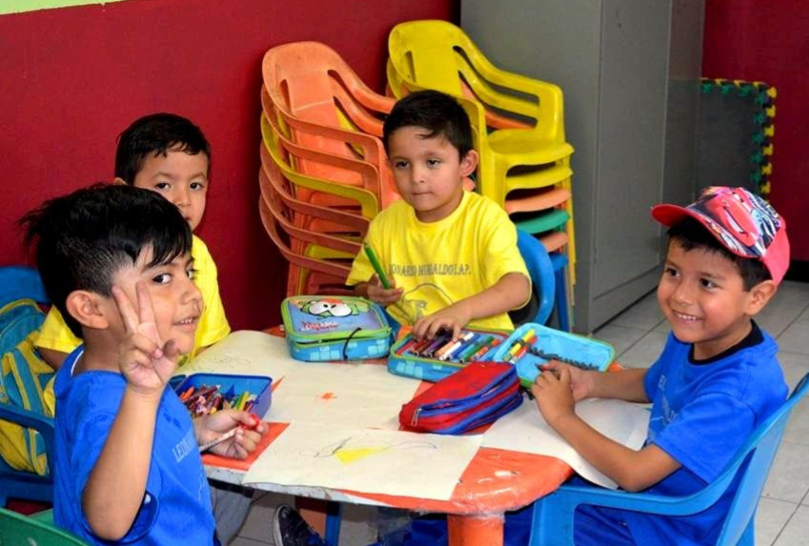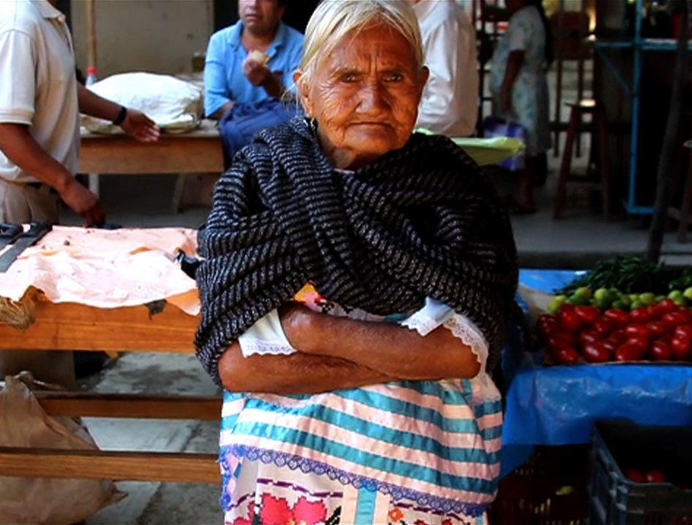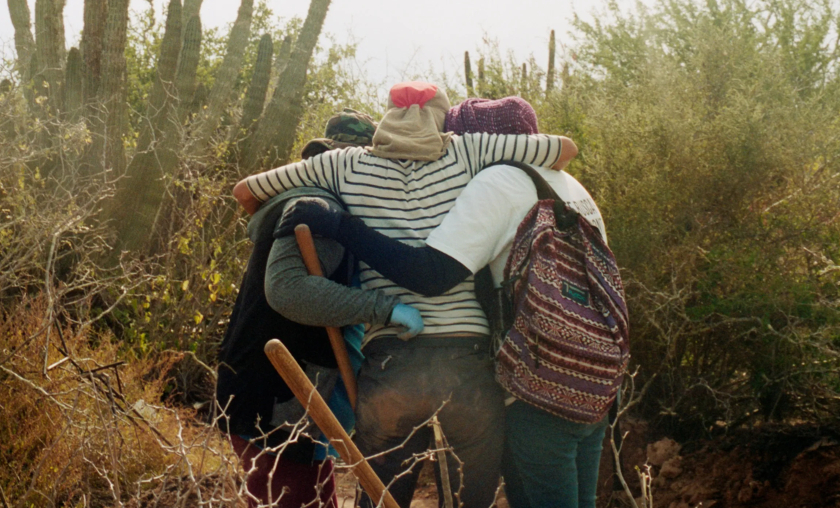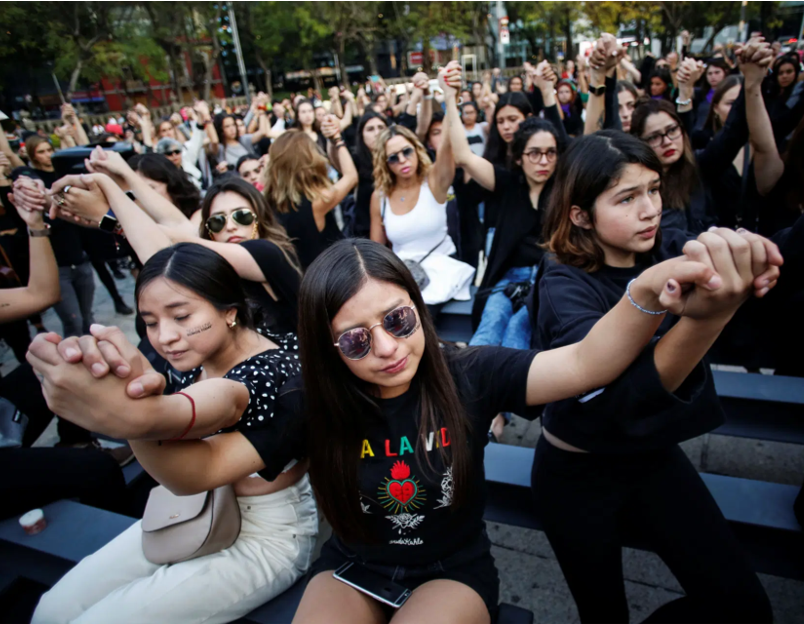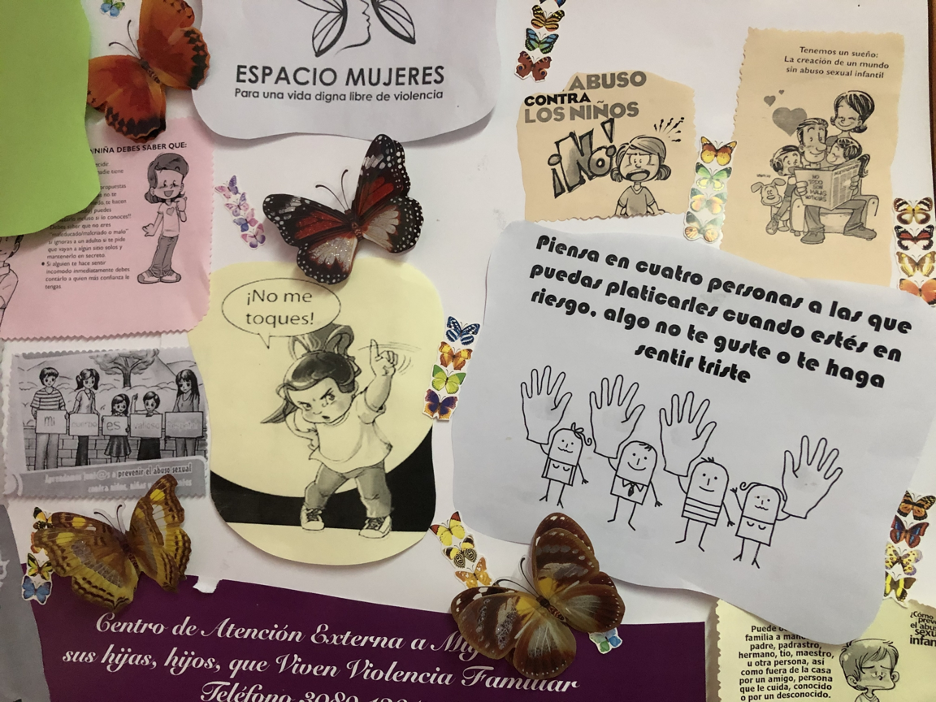|
|
The weekly newsletter of the Mexico Solidarity Project |
|
Every issue archived online at mexicosolidarityproject.org |
|
July 24, 2024 |
|
|
|
Weaponizing Fear: The Culture of Violence |
|
Meizhu Lui, for the editorial team |
|
|
Photo: Armando Vega |
|
The attempted shooting of candidate Trump reignited my fears. I was reminded that gunshots can erupt anywhere: at a school, a house of worship, a Walmart, a political rally, at home… Gunshots have become the soundtrack of our lives. Is there no place to find safety and peace?
Women in Mexico know this fear well. As we hear from Heather Dashner, feminists are demanding an end to attacks on women and the uncertainty of never knowing what happened to loved ones who were here today and are suddenly — gone. These women live daily with the horror of what they suspect happened to those who have disappeared.
What is the feminist response to this undercurrent of fear that so many of us endure?
There’s a wrong way: to allow our fear to be weaponized against people different from us. After the attempt on Trump’s life, his minions tried to turn fear into hate, pointing the finger at immigrants as the importers of violence with promises to punish them en masse. When women in Mexico’s Black Bloc physically assaulted women they disagreed with, that mimicked the macho response.
Heather’s brand of feminism goes a different route, emphasizing empowerment for women and compassionate care for the victims of violence. It calls for violence prevention, not only punishment. When AMLO said that to get at the roots of drug trafficking, we should use “hugs, not bullets,” he was promising to create more options for youth, so they aren’t recruited into the dead-end culture of violence.
We women can’t allow fear to overcome our instinct to protect and comfort. Instead, we must act to insist on safety and peace for all. |
|
Immigration, Democracy and the 2024 Elections
How to fight for an affirmative and humane immigration policy: Challenging the lies and racism of the MAGA right!
Interview with Nana Gyamfi, Emily Jieming Lee, and Jose Luis Granados Ceja Emcee'd by Democracy Now’s Juan Gonzalez. RealNews Network, YouTube |
|
For a deeper dive into current news and analysis in English, check out our media website. And definitely enjoy the new English podcast ¡Soberanía! (Sovereignty) with José Luis Granados Ceja and Kurt Hackbarth. They entertain, while dismantling the lies and distortions about Mexico fed to us by the mainstream media. |
|
Don’t miss an issue! Sign up for a free Mexico Solidarity Bulletin subscription. |
|
|
Mexico’s Feminist Movement Won’t Wait |
|
Heather Dashner has been a socialist feminist activist since the 1970s, when she disagreed with male leaders in the movement who believed that women's liberation should wait until after the working class took power. Fifty years on, Dashner recognizes that women remain an oppressed group based on their gender, and she’s been at the forefront of every struggle for women's equality in Mexico. Dashner has edited two books where she and her fellow women comrades tell their stories: Feministas Trotskistas in 2019 and last year’s Rebeldes y transgresoras. Feministas trotskistas, testimonios, 1974-1992. We picture her back in the day! |
|
|
Many Mexican feminists have not been happy with AMLO and don’t support Morena. Why?
In the first half of his term, AMLO made many disparaging remarks about “feminists, environmentalists, human rights advocates and animal rights activists.” He accused “neoliberals” of developing these organizations and issues to sidetrack his agenda.
Of course, some were neoliberal organizations, like the charro unions and peasant organizations, corrupt appendages of the PRI. But he painted entire movements with the same brush.
He preferred not to work with civil organizations such as feminist NGO’s but rather to talk directly with individual Mexicans as he traveled around the country. He favored providing direct cash transfers to those in need rather than funding existing programs. |
|
|
photo courtesy of GlobalGiving |
|
These practices were bad for women’s lives. He cut funding for Mexico’s excellent state-run child care centers. And women’s shelters? Cut. Yes, government programs had fat in them — but he used a machete where he should have used a scalpel! He believed direct payments to mothers or abused women were better and ignored the important role of women's organizations and service programs. |
|
The frosting on the cake that totally “frosted” women was his statement, “Let grandmothers take care of the kids.” Talk about no understanding of women’s oppression!
That said, in 2020 and later, the independent feminist movement became massive, holding huge demonstrations on International Women’s Day and on November 25, Latin America’s day against violence against women. At the same time, feminists were working within Morena. By the second half of his term, AMLO had stopped saying stupid things and did release some funds for shelters.
But haven’t there been gains for women during AMLO’s 6-year term?
Yes, the many old and young feminists working for a pro-woman agenda in Congress from several parties, including Morena, have been effective. A major win was gender parity for government officials. AMLO’s cabinet, for the first time in history, is half women. Where we had 9 women governors in 2018 out of 32, now we have 14. Half the members of congress are women. Another win — the Supreme Court declared abortion a human right and thus decriminalized it. An amazing victory, but not the same as ensuring safe and accessible abortion services; those rights have been won now in 14 states. |
|
|
Photo: The Rise of Mexican Rural Women, Wall Street Journal, 2012 |
|
Recognizing the unpaid labor of women in the home, the new president-elect, Claudia Sheinbaum, is taking up a proposal for women to begin collecting old-age pensions at age 60, while for men it’s 65. This educates the people on the value of women’s dual role in the workplace and at home. |
|
What are the main issues facing feminists today?
It’s not reproductive rights, as in the US. For old and young women alike, it’s the pervasive sexual and criminal violence against women in Mexican society. It ranges from verbal harassment to femicide — the murder of women just for being women. Women are demanding that the government recognize and prioritize their pain and fear.
Yes, the government has passed some new laws: the prohibition of online harassment, laws specifically against acid attacks, and legal repercussions for men who owe child support or have a history of physical or sexual violence. But laws on paper aren’t enough.
The government has found only a few of the country’s almost 100,000 disappeared. Frustrated, mothers have turned into investigators themselves. Hundreds of women have created brigades that comb forests, dig for forensic evidence, and go into morgues. One woman, who had been looking for her son since 2020, recently discovered that his body had been in the morgue for all those years. No one identified him or contacted her. This has sparked outrage! |
|
|
Three women embrace as they contemplate the body of a man they discovered after identifying and digging up a burial pit last year. Photo: Mallika Vora for The New Yorker |
|
The failure to convict perpetrators has also ignited widespread anger. In 95% of cases of violence against women, the accused is either not charged or not convicted; impunity reigns. Mexico doesn’t have trials by jury, so judges sitting in their offices review the paper evidence and make their decisions. One significant innovation mandating quicker oral trials rather than the paper ones is a step forward.
Police detectives don’t investigate crimes, a special ministry does. Their investigators are often in cahoots with the criminals — or at best, they're just plain sexist! Women don’t get justice.
And this is merely the “punitive” side, the side that looks at what to do with perpetrators. I and other feminists are fighting to look at what the victims need, too. Public discussion doesn’t emphasize services for the traumatized women (counseling, group therapy, help with work or family issues resulting from violence) or look more generally at the social side of crimes against women.
A plus: recently, a new Mexico City team of nine prosecutors specializing in the investigation of gender-based crimes, headed by a feminist lawyer that we respect, has been formed. And our movement and the new laws have changed the ethos of TV news: anti-sexism is now mainstream.
What strategies have worked to bring attention to women’s issues and to unify a feminist movement?
Mobilizations and marches are our most effective tools. In 2024, we had a massive march and brought together feminists of many stripes; when women come out in force, we can’t be ignored.
Certain feminist groups have also dedicated lots of time to lobbying the congress, and that has helped, too. |
|
For many years, large conferences brought feminists together across political lines. But in the last decade, several attempts at organizing conferences have been less successful. The anarchists in the Black Bloc have disrupted marches with violent acts against women they disagree with. In one case, they leapt up at a rally and literally threw people off the stage. |
|
|
Women protest gender violence and femicides at Angel de la Independencia monument in Mexico City, Mexico, Feb 22, 2020. Gustavo Graf/Reuters |
|
From another direction, in 2014, several well-respected feminist NGOs, instrumental in organizing these conferences, left the planning committee over differences with women in the PRD and boycotted the conference. This has led to a major split in the movement. My group participates in a women’s coordinating committee that convened the major marches in Mexico City, but it’s way too small to coordinate the entire movement, or even those marches. At the moment, the feminist movement is fragmented. |
|
|
Signs at a women’s shelter in Mexico City encourage female empowerment and provide tips for women facing violence. Photo: Emily Green/The World |
|
Right now, Morena is the only force that could convene a national meeting of feminists, and Claudia Sheinbaum, the president-elect, recently hosted a meeting of 1,000 women. She supports a “care and caring” economy as introduced by feminists who prioritize relief for indigenous women and maquila workers. |
|
Her slogan, “With Claudia, we all arrive,” is a powerful message from a powerful woman. But she’s not encouraging women to organize or work with their civil organizations. We will see more financial assistance for the poor in recognition of their humanity and dignity. But that’s not the same as women’s empowerment — that remains the work of an independent feminist movement. We have to get our act together! |
|
|
|
|
A Trump Presidency’s Effect on Mexico |
|
|
Bill Gallegos, a veteran Chicano liberation activist, environmental justice leader, and revolutionary socialist, has a lot to howl about. |
|
|
The US Republican Party held its national convention this week and, as expected, nominated Donald Trump to be their presidential candidate. Speakers treated convention goers to a consistent frenzy of near-hysterical anti-immigrant rhetoric, squarely placing the blame for the influx of immigrants on President Biden. Speaker after speaker accused the Biden administration of opening up US borders to all immigrants, always referred to as criminals, murderers, rapists, child-sex traffickers and the cause of the deadly fentanyl epidemic in the US. One speaker even claimed that US President Biden was encouraging 3 million undocumented immigrants to vote in the coming election!
The convention was a diabolical festival aimed at convincing US voters, mostly white but also from communities of color, to vote Republican in November and sweep Congress, the Senate and the presidency. To make his case, Trump used the bogeyman “evil immigrants” allegedly brought into the country by Democrats to dilute the blood of "real" Americans.
Already, the US has forced responsibility for migrants onto Mexico with the “stay in Mexico” policy. Taking in and caring for a population of millions would impose an enormous economic and social burden on Mexico. But the danger to Mexico is much more: Republicans threaten to launch missiles into Mexico to take out the drug cartels. This could injure and kill thousands. In the current degraded state of US politics, these threats are evoking little media or political outrage.
The threats of military action and ethnic cleansing would place enormous pressure on president-elect Claudia Sheinbaum’s new administration as she works to implement a progressive people’s program in Mexico.
More than ever, we need a robust solidarity movement between the US and Mexico — unions and worker centers, environmental justice and mainstream environmental groups. Women, youth and cultural communities must also reach out to each other. As the great African leader Samora Machel advised us, “Internationalism is strategy, not charity.”
Sí Se Puede! |
|
|
|
|
Recent news reports and commentaries, from progressive and mainstream media, |
|
Noam Scheiber, Caterpillar Factory in Mexico Draws Complaint of Labor Abuses New York Times. The number of Caterpillar workers in Latin America increased to just over 20,000 last year, as some American union complain, walking a thin line between rank nativism and international solidarity.
Kurt Hackbarth, Refundar la república Sentido Común. Con un Estados Unidos sobreextendido en Europa, Medio Oriente y el Pacífico, es además tiempo de explorar las nuevas posibilidades brindadas por la multipolaridad y las agrupaciones que se van formando fuera de las viejas fórmulas coloniales.
Erin Nelson, Laura Gomez Tovar, & Manuel Ángel Gómez Cruz, Mexico’s planned glyphosate ban helped show how agroecology can lead the way forward The Conversation. Stemming the tide of glyphosate is challenging, even when there is significant political will. This is likely at least in part due to the significant lobbying power of companies like Bayer.
Viri Ríos, Qué significa el atentado contra Trump para México Milenio. La intimidación será grande, pero México no debe olvidar sus fortalezas, pues a esta negociación llegará más fuerte que nunca.
Robert Preston, Mexico’s next president continues passenger train revival International Railway Journal. Claudia Sheinbaum, says that her administration will continue the programme to reintroduce long-distance passenger services to the national rail network, but with a focus on lines running north from Mexico City to the US border.
Ernestina Godoy Ramos, Humanismo mexicano y futuro El Universal. El Humanismo Mexicano descansa sobre dos pilares: la gran herencia cultural prehispánica portadora de virtudes excepcionales como la fraternidad, la libertad, la justicia y la honestidad y la aplicación de una política con dimensión social, justa y de carácter público.
Glenn Wilkins, Could China Help Mexico Become A Green Energy Powerhouse? Baystreet. Balancing Mexico’s strengthening trade relations with China as well as its diplomatic and economic relationship with the United States will be one of the most critical tight-rope acts for President Elect Claudia Sheinbaum.
Elena Burns, Un reducto del salinismo Sin Embargo. ¿Por qué Conagua da el agua de todos a privados? Porque para eso se creó…
Tamara Pearson, Land Defenders Shut Down a Toxic Mine. Now Its Corporate Backers Want Damages Truthout. A Canadian firm is demanding $200 million in damages from Mexico following the cancellation of its mining concessions.
Nancy Flores, Panel del T-MEC: última oportunidad para que México defienda el maíz Contralínea. Si México pierde, el mundo pierde. |
|
|
|
|
The Mexico Solidarity Project brings together activists from various socialist and left organizations and individuals committed to worker and global justice. We see the 2018 election of Andrés Manuel López Obrador as president of Mexico as a watershed moment. AMLO and his progressive Morena party aim to end generations of corruption, impoverishment, and subservience to US interests. Our Project supports not just Morena but all Mexicans struggling for basic rights and opposes US efforts to undermine organizing and Mexico’s national sovereignty.
Editorial committee: Meizhu Lui, Bruce Hobson, Agatha Hinman, Victoria Hamlin, Courtney Childs, Susan Weiss. To give feedback or get involved yourself, please email us! |
|
Subscribe! Get the Mexico Solidarity Bulletin in your email box every week. |
|
Web page and application support for the Mexico Solidarity Project from NOVA Web Development, a democratically run, worker-owned and operated cooperative focused on developing free software tools for progressive organizations. |

